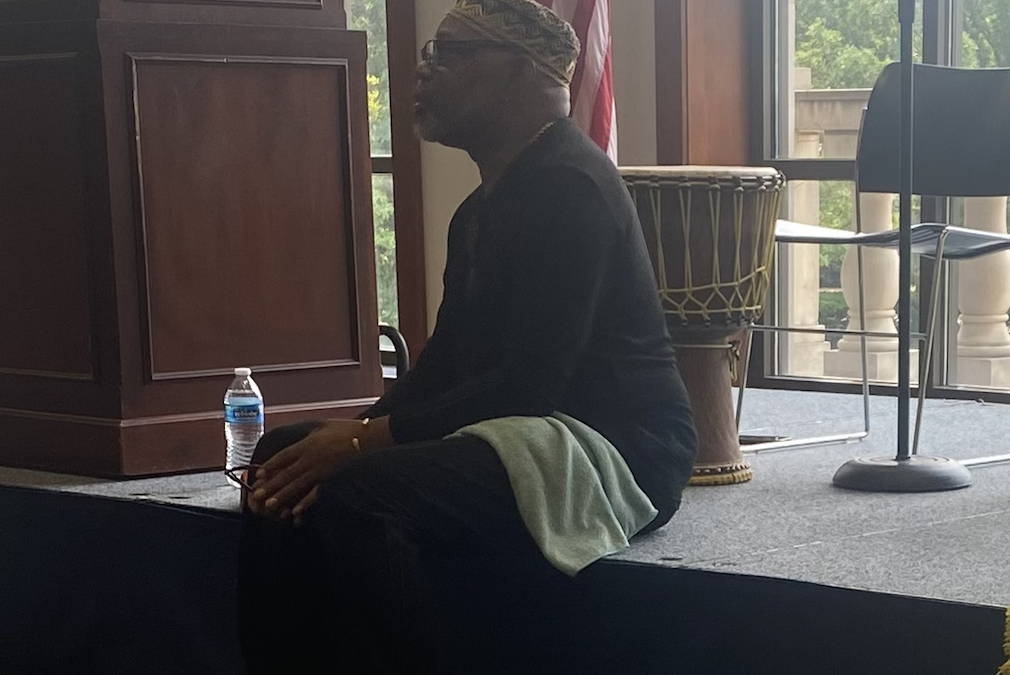Oba William King shares African American History through creative storytelling

A poetic storyteller sang and beat a drum, occasionally cueing the audience to chant along with him, creating a call-and-response effect that allowed the audience to contribute to the music.
The storyteller, who has about 30 years of experience in the art education business, is Oba William King. He came to Elmhurst University for its very first Juneteenth event to speak about the significance of the holiday and African American history on June 15, supplementing the history with various stories, poems, and songs.
King described Juneteenth as not only a commemoration of African American freedom, but also a time, “for us to read and learn.”
“It’s a time for us to heal and reach out to one another and do the best we can to make the world a better place,” King said during the performance.
According to King, Juneteenth is a commemoration of the two-year gap between when the Emancipation Proclamation was signed and the time when people in Texas were told that they had to free those held in bondage.
However, some masters were told that they could keep their slaves as long as they paid them, but they didn’t — they continued the same relationship.
King said that many people who were held in bondage left and tried to find a new world. As a result, many African Americans began to form a community called New Afrika.
“It would be a place where everyone felt freedom,” King said during the performance.
“There were times that the songs of the negro spiritual, those were the uplifting songs that would put us in a place of rest, joy, and sometimes there were hidden messages in those songs, and those hidden messages was how people were able to survive, and sometimes they learned how to get away from the plantation,” he continued.
In addition, King explained that many of the stories he tells were brought over from Africa during the transatlantic slave trade from the 16th to the 19th centuries; as Africans were held in bondage, they exchanged stories with each other.
He said stories can aid the process of education because they have a “stick-to-itveness.”
“They come in stories — faith, encouraging the creativity. Because a lot of times, storytelling just gives you an opportunity to like, you’ll see an hour go by,” King said in an interview with The Leader. “It didn’t feel like an hour. So the recipient becomes attracted to the medium, to the art form. Because it seems so accessible. And they enjoyed themselves.”
Rajeska Jackson, a grants coordinator at EU, appreciated the opportunity to learn more about African American history.
“I never knew what Juneteenth was until three years ago when everything started happening and stuff like that, so it’s good that we have people like him to come and tell the stories and let us know what actually happened,” Jackson said. “Because the books definitely don’t tell us. Even in Florida, they took Black history out of the history books.”
She continued, “For instance, he said some of the Africans ran away to Mexico for freedom. I didn’t know that because we’re not reading that; the history’s not offered to us. But I really enjoyed it to learn more about my ancestors and what they went through. Being forty-seven years old, there are a lot of things I still have to learn, still have to read up, and still have to think about.”
King hopes that attendees learned the importance of celebrating African Americans.
“The knowledge that American history has is incomplete without the story of the Black man, Black woman, African American people weaved into it,” King said in an interview with The Leader.
He also hopes attendees felt empowered to walk the path they were made to walk, gained an understanding of the power of empathy, received encouragement, and felt inspired to tap into their creativity.
“I want them to leave with the feeling, ‘I could do that’,” King said in an interview with The Leader. “You know, I liked that. I could do that. I’m gonna do that. You know?”



